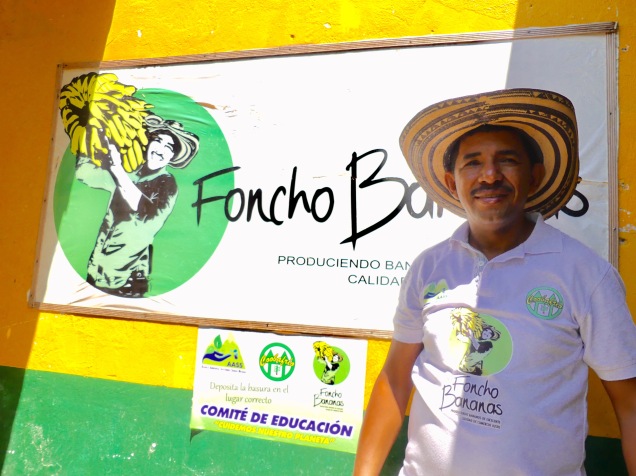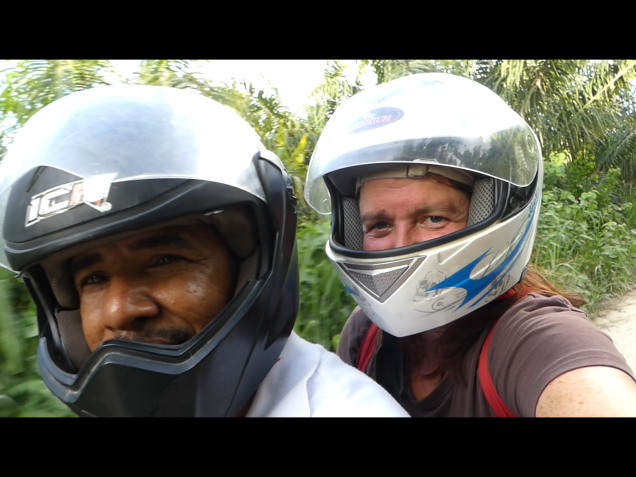It’s searingly hot, even when sat in the shade of the trees as, in a large football pitched size clearing in the middle of banana farms all around, a group of teenage boys and young men are being put thorough their paces . “Just look at those socks!” yells the grey haired trainer, sweat pouring off his brow. “Have you ever seen a professional footballer wearing silly little ankle socks? No! Because football is about discipline! What you do, the kids will copy. So make sure you do the right thing!”


These lads have all signed up for a course to learn how to be football trainers for the younger kids here in the Magdalena community at Rio Frio, close to Colombia’s Caribbean coast. To get here was a punishing 17 hour bus ride from Medellín, arriving at the coastal Lagoon town of Cienaga, where I was met from the bus by the friendliest smiling face ever to come out of Colombia. Foncho!

As I cling to the back of Foncho’s motorbike along many dusty roads over the next few days, it’s clear to me that quite a lot has changed since Albeiro Alfonso “Foncho” Cantillo, spearheaded our UK Fairtrade Fortnight campaign to Make Bananas Fair back in 2014. The sweating young men doing their footie exercises under the hot sun have signed up to train as trainers, with the aim of improving sport opportunities for the younger children in this rural area. It’s part of a bigger initiative that Coobafrío banana farmers have recently established in the community – a new school of sports and culture. Kelly Castañeda is a member of the local women’s committee playing a leadership role, and as we watch the boys, she shows me an impressively thick sheaf of papers with the constitution of the new school, the names of the farmers on its management committee, the agreement with local professional trainers and teachers, and parental permission forms and medical forms for all the young people enrolled to date. This farmer-led project means business – ensuring it is registered with local authorities so that they can access more facilities and be formally recognised as an educational service.

There’s been a lot of change for Foncho himself too since visiting the UK. Back then, he had only just started laying the foundations for a new house on a derelict plot in Cienaga. Supported by loans for purchase of building materials from the Coop, he and his family have now moved into the new house. With its shiny tiled patio and three bedrooms it’s a far cry from how he lived back on the farm. “I never imagined I would ever own a house like this,” he tells me.

His farm too has seen changes with the installation of a wire track to bring the bananas from the field to the little packing station, installed just in the past year, again using a loan from the Coop he has already repaid from banana sales in the past six to nine months. It’s much healthier than carrying bananas on their shoulders, and also reduces potential bruising to the fruit from farmers hauling the huge bunches around that way too. As we stand in front of his packing shed he outlines his next plans to extend the packing area to create a proper space for those working on the farm to rest, eat lunch, and a proper kitchen too. Foncho’s one hectare Finca Mercedes shares packing facilities with his neighbouring lifelong friend and ‘hermano’ Fabio whose farm Ana Maria, adjoins his own. The connections between families and friends are strong here – family members and neighbours working on each other’s farms interchangeably, and especially on harvest days, as they pack the bananas into the familiar black boxes I see when I shop at Sainsbury’s and the Fyffes branded boxes which are destined for the Coop in the UK.




The revolving loan fund for members of Coobafrío is just one of the financial support funds the cooperative provides. We’re back at the cooperative office when two older women enter. One of them is Señora Cenith Racine, a longstanding farmer member of the cooperative, and the other is one of her neighbours. With very little fuss, one of the cooperative accountants comes in with some papers for the neighbour to sign, to acknowledge receipt of COP100,000 towards urgent medical expenses for her sick husband. As the woman leaves with her money, Cenith remains to chat. She confides that her neighbours are living in very poor conditions and simply could not afford medical attention, which is why she’d sponsored their case to the cooperative’s aptly named Solidarity Fund. I feel slightly choked up having witnessed this modest, simple act of kindness from the cooperative towards a struggling member of the community. The fund is one of the services the cooperative can afford because of premiums from Fairtrade. “It’s not a lot of money, but it can help see you through times of trouble,” says Cenith, “A broken motorbike, medical costs, sudden funeral costs, that’s the kind of thing the solidarity fund can help with. When someone comes for help, members of the Coop check it is a case of genuine need and then contribute towards the costs.” Cenith then grins as she tells me she also a member of the Vigilance Committee, “We keep a watch on everything,” she says with a finger to her eye, “and make sure it’s all in order.” It’s good to see how the members are scrutinising how the Coop itself is living up to its objectives and rules, and how money is spent. This year Coobafrío is also providing grants to support fifteen children of farmers and workers to go on to further education. “It used to be that only 1% of farmers’ children here ever had the chance to go to university. I never had the chance,” says Foncho. “But now I reckon around 60% of our children are able to carry on studying.” That includes both his own children – his daughter has just completed an accountancy qualification, whilst his son is about to start studying Agronomical Engineering. The education theme continues as we pop around the corner from the Coobafrío office to the local pre-school, where another member of the cooperative is busy supervising the delivery of materials to build some new railings to keep the children safe.

The farmers are proud of what they’re achieving with their Fairtrade premiums, and have plans to expand their currently cramped office and storage space. But they have heard through their connections and social media networks about a recent announcement about Sainsbury’s tea removing the FAIRTRADE Mark in favour of their own scheme, which will not automatically deliver premiums to the farmers, but instead require them to submit project applications to a committee to access these funds. The banana growers, who sell the majority of their Fairtrade bananas to Sainsbury’s, tell me they’re now worried about their future sales too. I say I really don’t know if the same will happen in bananas, but at the same time I can’t help thinking how complex it would be for any committee in London to try to manage a project process for the many and varied purposes these farmers use their premiums for – including the operation of the various micro funds and all of their sub-projects, so rooted in local knowledge sources and ongoing community relationships. There must be at least a dozen different initiatives going on at any one time, on top of the core running of the cooperative itself and managing its business, and this is just one coop of many supplying bananas. Subsidiarity and self determination, along with the ability to flex in response to rapidly changing circumstances all seem key to efficiency and effectiveness here.

There are seven Fairtrade cooperatives of small scale farmers here in the Zona Bananera of Magdalena, competing for international markets with the larger plantations in the Urabá region of Colombia. Just before my arrival, all seven have been meeting to share cost of production data as part of the current review of Fairtrade’s minimum price – the farmers here are hoping for a 10 cent per box increase on the current US$7.25 to cover increased wage rates locally. But they are also acuteky aware of the need to remain competitive too.
Following the 2014 campaign, the farmers here were inspired by how Foncho’s involvement with the UK Fairtrade campaign helped raise their profile, and connected them in new ways both locally and internationally. Our campaign call to “Stick with Foncho”, associated one farmer as an icon for all the banana farmers and workers who deserve a fair price for their hard work. The seven coops here liked that idea too. I’m gobsmacked to find farmer after farmer wearing a white shirt with a “Foncho Bananas” logo, not even just in Foncho’s own Coop at Coobafrío, but also when we drop in on neighbouring cooperative in Guacamayal, Coobamag. I’m intrigued. “What do you really, honestly think of Foncho Bananas?” I ask, slyly adding “Wouldn’t you have liked it to be your name instead, instead of this cheeky fella’s?” Foncho grins. But not a single farmer takes up the bait. “Foncho bananas is the symbol for all the small scale family farmers here in Magdalena,” says Roger Martini, a member of Coobamag, and its treasurer. “We’re proud of it, we want our bananas and their origin from this region, and from small-scale family farms, to be better known, and that’s why we’ve now got our own brand.” I get it. This is a country after all that has created the Café de Colombia identity and Juan Valdez coffee brand. Whether the farmers will ever see their own logo stamped onto the banana boxes, as they would love to one day, is debatable. But it’s definitely bringing them together, united in promoting their region and their way of farming. I’m reminded of that classic “I am Spartacus” film moment – here in Magdalena, Foncho is no longer one man, but a cause and a mission. Now all the farmers, men and women, are Foncho.

On my last afternoon in the banana farms, just as the mosquitoes are starting to bite, we watch another class of young people from age 4 to late teens in Coofabrío’s school of sport and culture learning to dance a classic Colombian cumbia. They’re learning too about its cocktail of cultural roots, reflecting the small steps of African slaves wearing ankle chains, the ritual ceremonies of indigenous people, and the formality of the Spanish. (Here’s a little clip of them just getting started.)
There’s a subtle pride to the dance. And there’s an equal pride and dignity in what these farmers are achieving against such difficult odds, not just producing high quality fruit for export with all the complex logistics that involves, but being the innovators and the entrepreneurs in their community too. As the sun is setting, and Foncho and I bounce back on his motorbike along the rutted, dusty roads, past the farms and through the town, many people call greetings and wave. They all know Foncho, if not the strange gringa sitting behind him. But it doesn’t matter, because at that moment and there on the back of his bike, I am Foncho Bananas too.




Thanks for taking us with you!
LikeLiked by 1 person
Just read the blog Barbara, fascinating. Did not know about your travels, long may it continue!
Angela
LikeLiked by 1 person
Hi Angela! Glad you enjoyed the blog x
LikeLike
Moving and inspiring example of the benefits of the Fairtrade certificate Barbs.
LikeLiked by 1 person
Cheers Ju xx
LikeLike